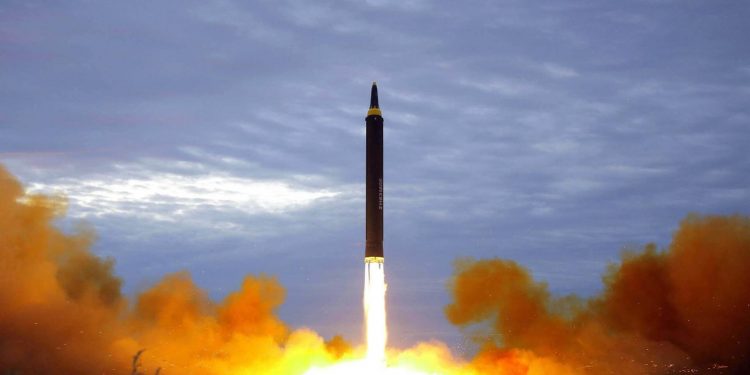North Korea successfully tested a new type of submarine-launched ballistic missile, state media reported Wednesday as the nuclear-armed country seeks to show off its ever-expanding military capabilities.
Tuesday’s test, carried out near Sinpo, the site of a major naval dockyard, came as both Koreas build up their weapons technology in what could become an arms race on the peninsula, and with Washington-Pyongyang dialogue at a standstill.
A proven submarine-based missile capability would take the North’s arsenal to a new level, allowing deployment far beyond the Korean peninsula and a second-strike capability in the event of an attack on its military bases.
The missile had “lots of advanced control guidance technologies”, the official Korean Central News Agency said.
But it added that it was fired from the same vessel that the North used in its first SLBM test five years ago, indicating that it may only have made limited progress in its launch capabilities.
Pictures in the Rodong Sinmun newspaper showed the black and white missile emerging from calm waters trailing a column of fire and smoke, and a surfacing submarine.
Washington, Seoul, and Tokyo have condemned the launch, with all three describing it as a ballistic missile, and diplomats told AFP that the United Nations Security Council would hold an emergency closed-door meeting later Wednesday on North Korea.
It came after Pyongyang in recent weeks tested a long-range cruise missile, a train-launched weapon and what it said was a hypersonic warhead, sparking global concern.
“We’ve seen so far five missile launches from North Korea in the past couple of months,” said Soo Kim of the RAND Corporation.
“And each test showed something ‘different’ in the way of Pyongyang’s missile capabilities. So the regime is adding more provocation tools, which isn’t exactly good news to the US, South Korea, and Japan.
“Kim wants attention, of course,” she told AFP.
The North — which invaded its neighbor in 1950 — is banned from developing nuclear weapons and ballistic missiles under Security Council resolutions, and is subject to multiple sets of sanctions as a result.
It says it needs its arsenal to defend against possible US invasion.
The White House said the test underscored the “urgent” need for dialogue with Pyongyang, with spokeswoman Jen Psaki telling a press briefing: “Our offer remains to meet anywhere, anytime, without preconditions.”
At the same time, South Korean President Moon Jae-in is pressing for a formal declaration that the Korean War is over — hostilities ceased in 1953 with an armistice rather than a peace treaty — before his term ends next year.
‘More feasible’
The North’s use of the same “8.24 Yongung” submarine that it tested five years ago means its exact sea-based launch capabilities remain unclear.
According to a 2018 analysis by the US-based Nuclear Threat Initiative think tank, the experimental vessel “appears capable of firing a single ballistic missile” and has to surface every few days, limiting its operational usefulness.
And the Pentagon and analysts say that the North’s last SLBM test in 2019 is likely to have been fired from a submerged platform.
Analysts said Wednesday’s images appeared to be one of the smaller missiles Pyongyang put on show at a defence exhibition last week.
Joseph Dempsey, a researcher at the International Institute for Strategic Studies, said that using smaller missiles could give Pyongyang “a more feasible delivery system”, including converting its existing attack submarines to missile vessels.
“North Korea’s capability to effectively manufacture large submarines remains questionable so this approach could be more realistic,” he said.
The weapons show in Pyongyang showcased the gigantic intercontinental ballistic missile (ICBM) Pyongyang revealed last year, among a host of other arms.
Opening the display, leader Kim — who has overseen rapid progress in the North’s military technology — blamed Washington for tensions, dismissing US assertions that it does not have hostile intentions.
For its part, South Korea last month tested its first SLBM, which put it among the elite group of nations that have demonstrated proven technology, and also unveiled a supersonic cruise missile.
Kim met three times with former US president Donald Trump, who boasted of stopping a war but failed to reach agreement on ending North Korea’s nuclear program.
Talks essentially stalled after a Kim-Trump summit in Hanoi collapsed in 2019.











